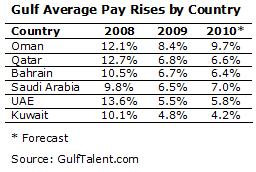The UAE and Kuwait have seen most job cuts and largest drops in pay rises. Real estate sector most affected, while audit professionals received the largest pay increases this year.
Professionals working in the Gulf region have been hit hard by the downturn, with almost two-thirds not receiving any pay increase and one in ten losing their jobs this year, according to research conducted by GulfTalent.com.
In its fifth annual survey of labour market trends in the region, entitled "Employment and Salary Trends in the Gulf 2009-2010", GulfTalent.com provided the first comprehensive account of the impact of the downturn on recruitment and pay.
Based on findings of the study, average salary increases across the six Gulf countries over the 12-month period to August 2009 fell sharply to 6.2% compared with 11.4% over the same period last year.

The drop was most severe in the UAE, which fell from 13.6% to just 5.5% this year, largely due to its heavy exposure to the real estate sector. Kuwait also saw a significant drop in pay rises from 10.1% to 4.8%, after the value of its financial investments collapsed.
Pay rises in Saudi Arabia stood at 6.5%, compared with 9.8% last year, the smallest fall among GCC countries. Massive spending by the Saudi government on infrastructure projects this year has helped maintain economic activity.
In terms of job categories, audit professionals received the largest pay rises at 7.5%, as demand for their services surged following the collapse of major global institutions last year.
With recruitment no longer a priority for businesses, human resource professionals received the region’s lowest pay increases at just 4.8%.
According to the report, reduced demand for talent and greater availability of candidates both regionally and internationally has shifted the balance of power from candidates to employers, easing upward pressure on salaries. 60 percent of professionals surveyed did not receive any pay increase this year at all, compared with only 33 percent last year. Of raises awarded, many were due to the momentum of the previous year and had been approved before the full extent of the downturn had become apparent.
While pay rises have slowed relative to the boom years, they remain high in comparison to other parts of the world, as the region’s slowdown has been less severe than those of US and European markets. Base salaries in the UK and US this year are estimated to increase at just 1.5% and 3.7% respectively, according to international surveys.
Moreover, for the first time in years, average pay rises in most Gulf countries have exceeded the rate of inflation. As a result, some residents saw an improvement in their quality of life and saving potential, particularly in Dubai and Doha where rents have fallen by over 30 percent this year, the report said. [See full report ]
Job Losses
Across the Gulf, 10% or one in ten professionals reported being made redundant. This was highest in the UAE at 16% and lowest in Oman at 6%. On a sector basis, real estate had the most drastic cuts, with 15% losing their jobs.

In terms of demographics, segments with the highest redundancies included senior executives at 13% and Western expatriates also at 13%.
Gulf nationals had below-average redundancies at 9%, in part due to government restrictions on termination of nationals, which have been made tougher during the downturn. With termination not an option, some employers interviewed by GulfTalent.com reported becoming more cautious in employing nationals.
Though some expatriate professionals who lost their jobs have returned home, the study found that many have been re-deployed elsewhere in the region. In particular, many have shifted from Dubai to neighbouring Abu Dhabi, Doha or Saudi Arabia. Survey data show that, among expatriates living in Dubai, the percentage who work in Abu Dhabi has tripled over the last year from 1% to 3%, a trend also observed in the increased traffic on the highway connecting the two cities.
Based on GulfTalent.com’s interviews, for companies operating across the region, the Saudi market has been a particular blessing this year. Given its large size and continued growth in some sectors, many firms have been able to grow their business in the Kingdom, compensating for reduced activity elsewhere.
Across the region, some businesses took advantage of the greater supply of candidates to get rid of under-performing employees and to replace them with higher-calibre professionals who had previously been either unavailable or unaffordable.
2010 Employment Outlook
GulfTalent.com’s study paints a mixed outlook for 2010. While 15% of companies surveyed reported planning further job cuts, 51% expected to increase headcount. Overall, the study predicts some pick-up in hiring activity next year, but warns that recruitment volumes will not reach the levels seen during the boom for quite some time.
Based on estimates collected from companies, the study forecasts average pay increases for 2010 at 6.3%, with Oman leading the increase at 9.7% and Kuwait having the lowest increase at 4.2%.
GulfTalent.com’s study was based on a survey of 24,000 professionals in the six countries of the Gulf Cooperation Council (GCC), as well as interviews with regional business leaders and human resource managers. The survey was conducted during September and October 2009, before news of the proposed debt restructuring by Dubai World. The full survey report entitled "Employment and Salary Trends in the Gulf 2009-2010" is available for download free of charge. [See full report ]
